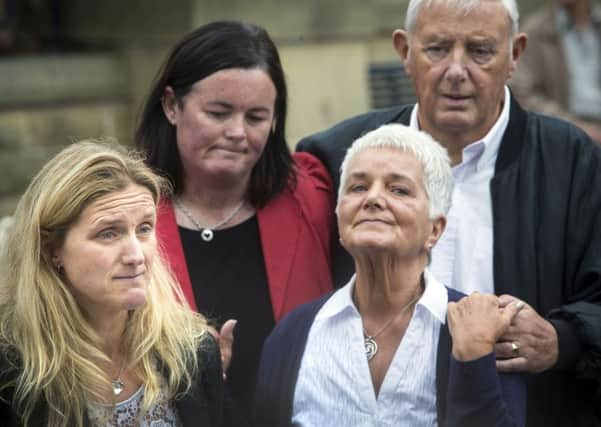YP Comment: How family's values shaped Jo Cox and her moral compass


Spoken with courage by the Batley & Spen MP’s distraught sister Kim Leadbeater, only pausing briefly when she looked for encouragement from her grieving parents Gordon and Jean as they clutched each other for comfort, it was truly humbling that this brave family were able to speak with such compassion for others, and so little hatred, after their sudden and senseless loss.
Nothing could have prepared for them for this daunting task in their darkest hour – or the overwhelming outpouring of grief that has seen numerous vigils of remembrance, donations in excess of £700,000 to three charities and Parliament recalled for further tributes.
Advertisement
Hide AdAdvertisement
Hide AdAn ordinary family thrust into the global limelight in extraordinary circumstances, it was so typical of their generosity of spirit towards others that they should think of others in their hour of need, whether it be all those who have sent messages of support or their recognition of “the brave and courageous” pensioner Bernard Kenny who was injured as he tried to fight off the alleged assailant.
From the depths of despair, the family summoned the courage to offer this noble message of hope: “We have to continue this strength and solidarity in the days, months and years to come as part of Jo’s legacy – to focus on, as Jo would say, ‘that which unites us and not which divides us’. For now our family is broken, but we will mend over time. Jo will live on through all the good people in the world.”
A sentiment shared by the late MP’s bereft husband Brendan, whose tweets are coalescing around the Twitter hashtag #MoreInCommon as social media changes the dynamics of debate, it was striking that some – but sadly not all – politicians were more measured as the EU referendum campaign resumed.
This votes goes to the core of Britain’s democracy – a democracy that a defenceless Jo Cox was upholding when her life was violently snatched away – but there is still no justification for much of the embittered language which preceded last Thursday’s terrible tragedy.
Advertisement
Hide AdAdvertisement
Hide AdAll should remember that Batley’s MP, lauded by Dewsbury-born Betty Boothroyd, the former Speaker of the Commons, as a champion of compassion, was able to stand above the type of personal abuse that now constitutes political debate in this country because her arguments were expressed in a manner that did not require gratuitous insults.
As the Reverend Paul Knight likened the politician to a “21st century Good Samaritan” during a service at St Peter’s Church, Birstall, he added: “There is much wickedness in our world. But thank God there is so much goodness – goodness that does not recognise colour, not nationality.” This is the moral compass, shaped by her family, that guided Jo Cox on her life’s all too short journey of enrichment – and which now needs to guide the country as a MP like no other is remembered for her humanity to all.
On the right track: Forging a new transport policy
GIVEN the chequered recent history of Leeds when it comes to public transport, it would be churlish not to acknowledge the opening of the long-awaited Kirkstall Forge station – and the wider significance of this development.
Like the new station which opened at Apperley Bridge towards the end of last year, new infrastructure – whether it be the provision of transport, schools or health services – needs to precede major new developments where possible if sites earmarked for regeneration are to fulfil their potential.
Advertisement
Hide AdAdvertisement
Hide AdIn this regard, Kirkstall Forge is the template for the future. Its opening will now pave the way for new homes and offices to be built on one of the largest brownfield sites in a previously neglected part of Leeds, although the proximity of the flood-prone River Aire makes it essential that all new buildings are flood-proofed from the very outset.
Yet, while these stations have taken the best part of a decade to deliver, and only reverse a tiny fraction of the Beeching cuts of five decades ago, they alone will not tackle the transport crisis afflicting Leeds and other parts of the region.
Like the region’s gridlocked roads, Yorkshire’s rush-hour railway lines are already operating at capacity and much-promised new trains, together with track improvements that will enable more services to operate at busy times of the day, cannot come a day too soon.
The importance of this should not be overlooked in Leeds as the city’s leaders determine the future of transport policy after its controversial trolleybus scheme was, thankfully, vetoed by a public inquiry.